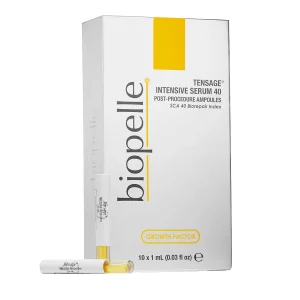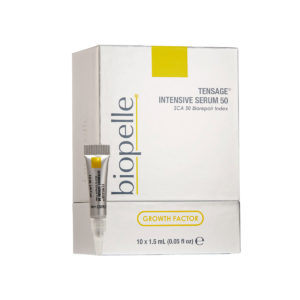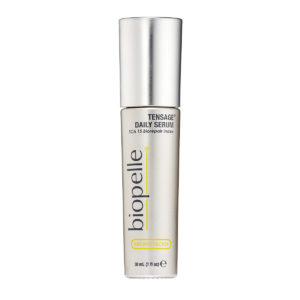Browsing for skincare has never been more daunting. There are serums, oils, exfoliators and moisturizers, scrubs, toners and creams – some for day, some for night. They promise to soften wrinkles, reverse damage and make skin glow, all with “anti-aging” or “age-defying” properties. Many also vow that they are all-natural, green, organic, hypoallergenic, cruelty-free, vegan or chemical-free. And the consumer is expected to make a choice based on marketing buzzwords and cost.

Tensage Intensive Serum 40
Tensage Intensive Serum 50
Tensage Daily Serum
Furthermore, many, many brands use words like “doctor-approved,” “dermatologist-recommended,” or “dermatologist-tested.” They are terms that generate consumer trust, though they can also be misunderstood, partly because there are no regulations that specify how each term can be used.
The global skincare market increased by nearly 60% in the 10 years between 2008-2018, according to financial analyses and is expected to reach $180 billion worldwide by 2023. And in one quarter in 2020, 1.68 million Americans spent $500 or more on skin-care products, according to U.S. Census data. That’s an average of more than $160 a month per person.
With so much money in the industry, brands use many different marketing words to try to sway you. In the midst of all this, how do you find skin-care products that work, where results are backed up by science and clinical trials?
What Does It Mean for a Brand to Have a “Professional Heritage?”
If a product is developed for and sold directly to consumers, the marketing tends to be flashy – cosmetic ads in glossy magazines and commercials on television where celebrities with glowing skin smile. But think about the focus and the costs involved in that advertising. The companies hope you will believe your skin will resemble the celebrity’s skin and you can be sure the costs of those endorsements are passed directly on to you.
Other products, however, are developed for and sold primarily through skincare professional partners, such as dermatologists. This is the case with Biopelle, whose award-winning skincare products are clinically proven and have only recently become available direct-to-consumer.
What Do Dermatologists Look for When Recommending a Brand?
Dermatologists know that skin type and skin concerns are perhaps the most important factors when it comes to finding professional skincare products that work for each of us. Do you have dry skin? Oily skin? Are you prone to acne? Is your skin extra sensitive? Do you have any allergies? What are your skincare goals? After that, dermatologists look for the following, according to the American Academy of Dermatology Association (AAD):
- Sunscreen: Protection from the sun’s UV rays is critical. Sunscreen reduces skin damage and your chances of getting skin cancer. They favor sunscreens that are broad-spectrum, SPF 30 or higher, and water-resistant.
- Moisturizer: Specifically, one whose ingredients have been clinically proven to reduce the signs of aging.
- Ingredients: A dermatologist can look at a product’s list of ingredients – and/or the results of any clinical studies – and understand, better than a consumer, the effects those ingredients will have on your skin.
- How was the product tested and studied? Again, this is something dermatologists are more sophisticated at analyzing than is the average consumer.
- Product labels: Is the product hypoallergenic? Is it non-comedogenic or non-acnegenic, which means it does not cause acne?
- Cost: Some inexpensive products work as well as some that cost more; a dermatologist will be better able to tell you what’s worth paying extra for in a product.
What Makes Biopelle a Professional Skincare Brand?
Biopelle was founded in 2005 and has built its credibility working with leading dermatologists and laboratories across the world to source and rigorously study innovative ingredients and technologies that create visible results in the skin; it focuses on skin repair through unique metabolic pathways to help support and optimize skin’s health and appearance.
Biopelle studies and uses growth factor benefits, antioxidants, skin stem cells and patented technologies, such as SCA Biorepair Technology, which uses a natural secretion from the Cryptomphalus aspersa snail that has been proven to promote healing in damaged skin. Its Tensage line of products – which includes serums, moisturizers, eye creams and cleansers – makes use of this technology. There’s also a product line called Emepelle, which helps improve the appearance of Estrogen Deficient Skin in perimenopausal and menopausal women.
And it works. Biopelle is not only backed up by the dozens of dermatologists who recommend it, the brand also has clinical trials and results to prove their products work. No buzzwords — just results
Just one example: In a 90-day clinical study of Tensage Growth Factor participants saw:
- 78% improvement in skin’s luminosity
- 46% visible reduction in wrinkles
- 40% more even skin tone
Biopelle offers a wide range of products based on skin type and concern, as well as product type and main ingredients. Biopelle’s different collections include solutions for anti-aging, Estrogen Deficient Skin, hyperpigmentation, sensitive skin, healthy skin maintenance, pre-procedure care and post-procedure care (such as laser treatments, chemical peels and dermabrasion). Shop Biopelle now.



